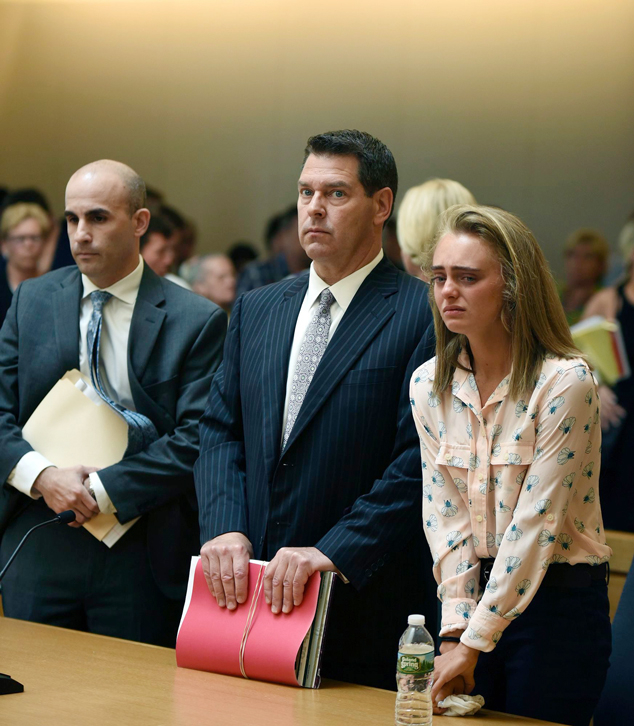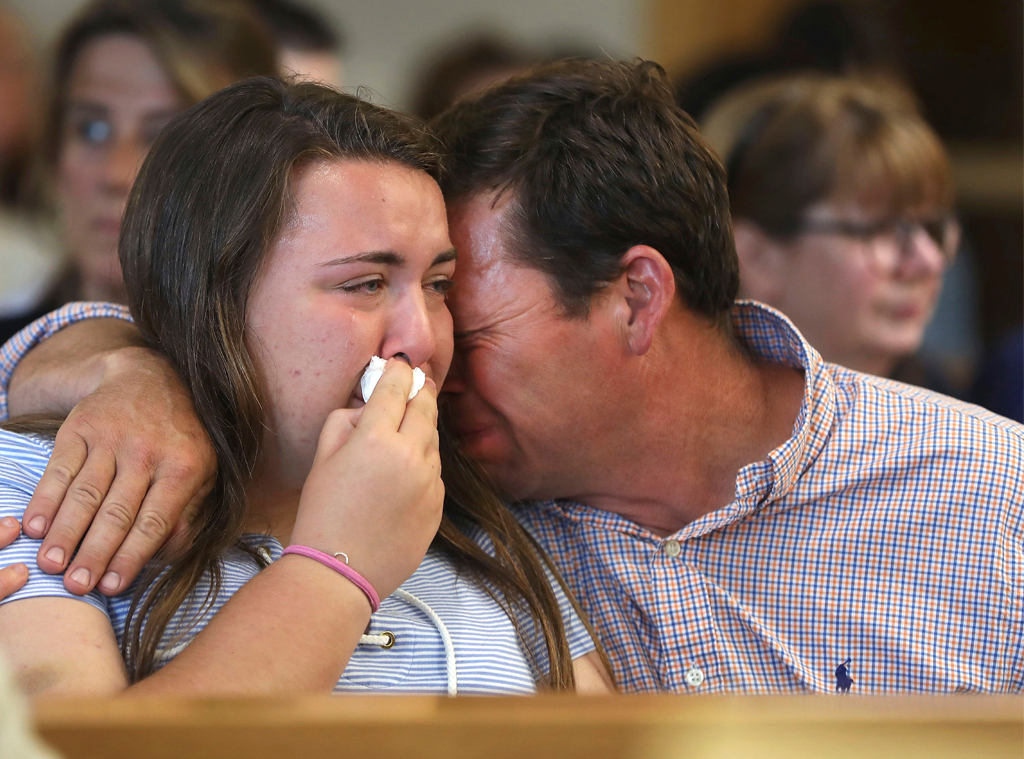Michelle Carter is going home.
The now 23-year-old Massachusetts woman who was convicted of involuntary manslaughter for encouraging her boyfriend to kill himself, and then not taking any action when she knew he was in the process of taking his own life, is being released from prison four months early for good behavior. She has been locked up since February 2019.
The confounding tragedy involving two troubled teens started ongoing conversations about digital relationships, toxic texting, bullying, teen isolation, mental health, free speech and what, exactly, constitutes responsibility. The big question was: Did a 17-year-old Carter’s actions really play a pivotal role in 18-year-old Conrad Roy III‘s death by suicide?
A judge decided that they did, and she was sentenced to 15 months in prison.
Her lawyer immediately appealed to the Massachusetts Supreme Judicial Court, arguing that Carter’s text messages were protected speech under the First Amendment, but was denied.
Still, as callous as her behavior seemed, plenty of people weren’t convinced that Carter was responsible for Roy’s death (involuntary manslaughter is defined as the crime of killing another human being unlawfully but unintentionally).
A recent high school graduate, Roy had been accepted at Fitchburg State University for the fall. But on June 13, 2014, he made a video on his computer in which he talked about his struggle with depression. He had attempted suicide in the past.
A month later, Roy drove his truck to the parking lot of a Kmart in Fairhaven, Mass., and sat in the truck with a running motor pump until he died of carbon monoxide poisoning.
It turned out he had exchanged text messages with Carter all day leading up to his death and they talked on the phone while he was in the parking lot. It would later be revealed that the pair had only seen each other in person a handful of times. Their relationship mainly took place in the digital realm, where they shared their innermost thoughts via text message.
At one point, Roy had apparently climbed out of the vehicle and he expressed reservations to Carter about going through with killing himself.
She later texted a friend that she had told Roy on the phone to “get back in” the truck.
Unfathomable? Yes. Cruel? Certainly sounds that way. But criminal?
Roy and Carter “were each other’s confidante,” Erin Lee Carr, director of the 2019 HBO documentary I Love You, Now Die, told E! News last summer. “I think that you consistently see Michelle Carter reaching out to people for support and Conrad was sort of like this friend that was always in her ear. They communicated so much at these crazy intense intervals, and they really shared things that they had not shared with others.

John Tlumacki/The Boston Globe via Getty Images
“So there was an intimacy and a closeness that was insane,” Carr continued, “given the fact that they had only met a handful of times, and they said things like ‘I love you,’ and it was incredibly romantic, but they were not ever able to consummate the relationship, not that we know of…It’s hard for me to think about this pen pal inside your phone that knows every one of your secrets, but this is how teenagers communicate. This is not unique to just Conrad and Michelle. This sort of communication, this intimacy, exists.”
Carter also battled depression and had previously attempted suicide. Investigators found that she and Roy had exchanged thousands of text messages, and he had confided in her that he wanted to end it all.
In some of the texts later shared at trial, Carter had written to Roy messages such as, “Drink bleach. Why don’t you just drink bleach? Hang yourself” and “Jump over a building, stab yourself, idk. There’s a lot of ways.”
“Everyone will be sad for awhile but they will get over it and move on,” she also wrote to him. “You just need to do it, Conrad…No more pushing it off. No more waiting.”
They exchanged dozens of messages on July 12, 2014, according to a log published by Boston 25 News, starting with Roy checking in with Carter at 12:40 a.m. after she had apparently fallen asleep. She replied at 4:07 a.m. and moments later asked, “Why haven’t you done it yet tho?”
At 4:28 a.m. he wrote her, “I really don’t know what I’m waiting for.. but I have everything lined up.”
She wrote back, “No you’re not Conrad. Last night was it. You keep pushing it off and you say you’ll do it but u never do. Its always gonna be that way if u don’t take action.” Then, “You’re just making it harder on yourself by pushing it off, you just have to do it.” Followed by, “Do u wanna do it now?”
This went on for awhile longer and Carter wrote “Love you” at 4:35 a.m. Roy replied, “thank you :)” Her reply, “For what” went unanswered until 9:03 a.m. when she asked if he was awake. At 9:17 he said yes and then the conversation about when and where he was going to do it continued for hours, interspersed with declarations of love and support from Carter as she simultaneously told him he should stop thinking so much and just go through with it.

Charles Krupa/AP/Shutterstock
Roy’s last text to her came in at 6:25 p.m.: “okay I’m almost there.”
“Okay,” Carter wrote at 6:28. At 9:19 p.m. she wrote, “Please answer me.” And then “I’m scared are you okay? I love you please answer.”
At 10:38 p.m. Carter wrote, “You’re at your dad’s…Camdyn told me. I’ll get you help soon I guess.” And “I thought you actually did it.”
“He called me and I heard like muffled sounds and some type of motor running and it was like that for 20 mins and he wouldn’t answer,” Carter wrote in a text to a friend at 9:24 p.m. “I think he killed himself.”
Roy’s body was found on July 13.
On Sept. 15, 2014, Carter wrote in a text to another friend, “His death is my fault like honestly I could have stopped him I was on the phone with him and he got out of the car because it was working and he got scared and I f–king told him to get back in.”
In the lengthy message, she also wrote that she couldn’t stand seeing Roy in so much pain, and that therapy “didn’t help him.” She had tried to get him to check into a mental health facility with her, Carter added, “but he would go in the other department for his issues but he didnt wanna go because he said nothing they would do or say would help him or change the way he feels.”
She continued, “So I like started giving up because nothing I did was helping and but I should of tried harder like I should of did more and its all my fault because I could of stopped him but I f–king didnt all I had to say was I love you dont do this one more time and hed still be here and he told me he would give me signs to know he is watching over me but I havent seen any and I just idk I’m sorry about this rant I just needed to get that off my chest and its finally all sinking in.”

Glenn Silva/Shutterstock
Carter was indicted on Feb. 5, 2015, on a charge of involuntary manslaughter as a youthful offender. After motions to dismiss were denied, she ended up waiving her right to a jury trial, and it was Judge Lawrence Moniz who concluded in 2017 that the teen was guilty as charged.
The prosecution alleged that she badgered Roy to his death to attract the attention that being the girlfriend of a boy who killed himself would inevitably bring. The so-called smoking gun in their case was the text to her friend in which Carter claimed she told Roy to get on with it, which the prosecution offered as a confession. Carter did not testify in her own defense at trial.
Moniz considered her recollection that she “could have stopped him” to be the moment when she became criminally responsible. He sentenced her to two and a half years in prison, with a requirement to serve 15 months.
She was allowed to remain free, however, until the state appeals process had been exhausted, meaning she ultimately spent less than a year behind bars at Bristol County House of Corrections in Dartmouth, Mass.
The state parole board denied Carter’s petition for early release in September, stating in their decision that they remained “troubled” not only by her role in “facilitating” Roy’s death by suicide, but also that she “actively prevented others from intervening.” And as far as the board was concerned, no one had adequately explained her lack of empathy at the time, nor proved that she was fit to rejoin society just yet.
“Ms. Carter’s self-serving statements and behavior, leading up to and after his suicide, appear to be irrational and lacked sincerity,” the board wrote.
“I think she belongs in jail for a longer time than she even got,” Conrad Roy Sr., Roy’s grandfather, said at the parole hearing. “I still don’t have my grandson back, why should she be out, free to enjoy life, when my grandson doesn’t have a life to live?”

Pat Greenhouse/AP/Shutterstock
Also last year, state legislators introduced a bill that would officially make suicide coercion a crime with a penalty of up to five years in prison. Named “Conrad’s Law,” it had the full support of Roy’s family.
“Truth be told, if this law existed my son’s case would have been settled more easily,” his mother, Lynn Roy, testified before lawmakers. “What happened to my son is tragic and I don’t want another mother to feel the way I do.”
A decision on whether to pass the bill—whose opponents argue that it’s an attack on free speech and open to far too broad of an interpretation as to what constitutes “coercion”—is expected by mid-February.

HBO
Meanwhile, Carter’s release was scheduled for today.
In I Love You, Now Die, director Erin Lee Carr set out to explore the sequence of events leading up to Roy’s suicide, as well as any possible societal factors that may have contributed to the villainizing of Carter—aside from the picture her texts themselves painted, of a girl who agreed with her boyfriend that he should take his own life, and only continued to encourage him when he put that plan in motion.
“We feel pretty unclear about what her motives were,” Carr explained to E! News last summer ahead of the documentary’s premiere. “The prosecution alleges that she helped convince a guy to kill himself to become popular. That’s too simplistic. And so I think, because she didn’t testify in her own defense and because she was found guilty, it’s sort of this meandering question of, like, Who really is Michelle Carter?”
Roy’s family participated in the film, which Carr wanted to be as much of a portrait of the young life lost as it was about the convicted perpetrator, but Carter’s did not. Carr told E! that Lynn Roy telling her she had done a good job, after they arranged a screening for her at the HBO office, was the best review she could possibly get.
Carr admitted that, when she first embarked on the film, she initially thought that Carter’s actions were “amoral and illegal.” By the end, however, “I think there are reasons to doubt the conviction.”
Earlier this month, the U.S. Supreme Court refused to hear her case, which had been winding its way through the lower courts for over a year. Her legal team has maintained that her conviction was an assault on free speech (groups such as the ACLU have agreed), that Roy ultimately acted on his own, and that what Carter texted to her friends about what she supposedly told Roy was not reliable evidence.
But though the conviction stands, Carter is going to be a free woman.
“There have been no problems and she has been attending programs, which is common at state facilities like the Bristol County House of Correction,” Bristol County Sheriff’s Department spokesman Jonathan Darling told Boston 25 News. He added in an email that Carter got along with other inmates, “is polite to our staff and volunteers, and we’ve had no discipline issues at all.”
If you or someone you know needs help, please call the National Suicide Prevention Lifeline at 1-800-273-TALK (8255).
